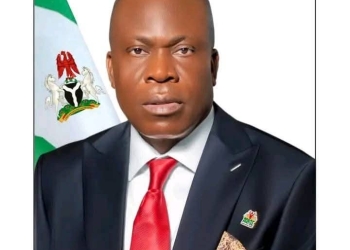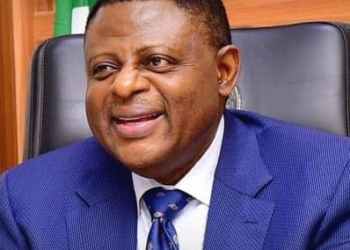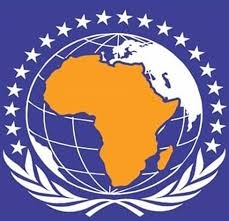AIG. Tunde Johnson Ogunsakin (Rtd).
OPINION
By Sam Akpe, Abuja
Two books were billed for presentation on that day. One of them was entitled: The Power of Information Sharing: Antidote to Nigeria’s Security Threats. That title instantly attracted my attention as I looked at the invitation card.
Then I noticed something else. Tunde Johnson Ogunsakin, a retired Assistant Inspector General of Police, was billed to speak at the event on the topic: Inter-Agency Unity: The Power of Collective Action. That topic and the presenter quickly ignited something in me.
Known by friends and colleagues simply as Tunde, before his premature retirement from the force when someone junior to him was appointed an Inspector General, I had followed Tunde’s interesting career in the police force from the time he headed the operations department of the ICPC.
I recall that both himself and the then ICPC Chairman almost locked me up over exclusive stories I used to get from the Commission. They were constantly shocked by the embarrassing accuracy of the reports and demanded to know my sources. That did not happen.
I can boldly describe Tunde as an accomplished law enforcement professional specifically in the anti-financial fraud policing squad. His active 32 years in the force exposed him to comprehensive involvement and wide experiences in financial crime policing around the world.
He is also known to have exhibited unquestionable professionalism through swift resolution of complex financial crime issues in and outside Nigeria.
Even in retirement, he is still top-rated by colleagues and superiors as an exemplary anti-financial crime crusader, skillful at managing puzzling situations, creating and implementing effective law enforcement strategies, while silently exhibiting pragmatic moves aimed at achieving positive results.
When he was appointed head of operations at the Economic and Financial Crimes Commission (EFCC), Tunde spared no one, including those called untouchables. He arrested, locked up and prosecuted whoever deserved to face the law.
When it comes to inter-agency crime fighting, Tunde is seen as an authority. He is a veteran of the INTERPOL crime investigation where he worked and shared intelligence with colleagues from Canada, Britain, Holland, France, Italy, Switzerland, and other countries.
So, listening to him speak on intelligence-sharing and inter-agency unity among security forces across Nigeria for purposes of successfully fighting crimes was like experiencing a cold breeze in a hot January sun of Abuja.
Seated and listening were representatives of Service Chiefs and other security officers. If I can still recall appropriately, the National Security Adviser was equally represented.
There is no questioning the fact that maintaining internal security in any country is a collective responsibility. It demands synergy among distinct security bodies. As Tunde observed, maintaining internal security is fundamentally anchored on creating and sustaining inter-agency unity.
Simply put, inter-agency information sharing connotes cordial relationships and cooperation among security outfits across the country. This is not in ignorance of the fact that each of the component elements of security agencies has a different but complementary role to play.
Inter-agency unity aims at collaboration and coordination among these different agencies towards achieving common goals, which is the security of the country.
As declared by Tunde, the power of collective action is significant as it can lead to more effective solutions, improved resource allocation, and enhanced problem-solving capabilities.
His position is that inter-agency unity should be seen as a vital mechanism for managing conflicts and containing insecurity. This is because globally, each security agency has unique capabilities and operational skills that complement one another.
Specifically, inter-agency unity enhances security synergy and exchange of ideas and information among the operatives, while creating a platform for collective networking and planning of security activities, thereby building a database for preventive action.
Another advantage is that it provides a forum for analysis of conflict indicators and processing of security-related information for early warnings and timely response; and also serve as a channel for the dissemination of security reports to all stakeholders.
How far have Nigerian security operatives and agencies taken advantage of this global initiative enforced after 2011 in the aftermath of the attack on the World Trade Centre in New York? It does not look like much has been done.
Critically examined, inter-agency unity in Nigeria has become necessary because, if truth must be told, certain security agencies have not optimally lived up to expectations in view of the ever-increasing and dynamic security challenges.
As observed by the veteran police officer, a combination of two or more hands has become necessary, because “a government agency may be willing to perform its responsibilities effectively but may be constrained due to the huge cost of running these agencies.”
He observed that over the years, there had been continuous emphasis on the essence of inter-agency unity. However, nothing appears to have changed. There is still high level of un-cooperativeness among the agencies. Each has become an authority to itself.
In his words, the situation “calls for urgent action of the top echelon of all the security agencies in order to ensure national security and achieve maximum results in the security management of the country.”
Tunde himself knew as he spoke that challenges to national security in Nigeria have expanded significantly from the traditional state-based threats of the Cold War era to include the emergence of unconventional threats from non-state actors.
Such new threats are diffuse and ambiguous and include terrorism, cyber-attacks, drug trafficking, infectious diseases, and energy threats.
Equally, the scenarios arise from multiple sources and, because their interrelated nature makes it difficult, if not impossible, for any single agency to effectively address them alone, they absolutely require enhancement of collaboration among agencies and international partners.
Stated Tunde, “the challenges militating against inter-agency cooperation for the Armed Forces of Nigeria and other security agencies in national security operations are many.
“Some of them are lack of strategic guidance for inter-agency cooperation, inadequate intelligence, technical equipment, and insufficient capacity for national security operations.
“It must also be noted that Nigeria’s porous borders facilitate the infiltration of adversaries from West Africa, which means that four countries in the region rank among the ten most terrorized globally.
“As a result of Nigeria’s porous borders, no single agency can effectively tackle the complex security issues facing the nation, which calls for deeper collaboration among security agencies.
“We must understand that modern security threats, and coordination influenced by technology and non-state actors, require a coordinated response to ensure national security.”
He noted that the operating environment has evolved to a point in our history where no individual service or agency can independently tackle the threats to national security successfully.
This makes it crucial for a synergy to be developed among security agencies in the implementation security strategies. Absence of such synergy among security agencies, stated Tunde, connotes absence of a coordinated approach to the prevailing security challenges.
He cited an instance: “in the Northeast for example, the Nigerian Air Force provides air support, aerial surveillance, casualty evacuation and logistics airlift for troops while the Nigerian Navy has deployed its Special Boat Services and operationalized its Forward Operation Base in Baga as part of the overall operations on the Lake Chad waters.”
As analysed by Tunde, there are however certain roadblocks that are currently impeding the functionality of inter-agency unity among security bodies in Nigeria.
One of them is what he calls “institutional constraints” He explained, “many of the allegations leveled against security agencies and their personnel, include arbitrariness in exercising its power, corruption, perversion of justice, and delays in the administration of justice.”
Next is inadequate manpower due to numerous on-going operations in the country. This is because the challenging security environment has necessitated numerous deployments in ongoing operations.
“This can sometimes impede the possibility of different agencies coming together to carry out joint operations. This situation does not give effect to inter-agency unity and the gains of collective action,” observed Tunde.
Inter-agency unity is also hampered by the poor conditions of service of the average security officer and inadequate funding of agencies.
Arising from this are “lack of logistic support and infrastructure, and absence of technological equipment to cover all the areas of the state are responsible for the current state of the general national insecurity in Nigeria,” said Tunde.
Absence of inter-service communication was also mentioned by him. Inter-service communication is required to ensure prompt command and control. Its absence hampers quick relay of information among the services, especially when clashes are in the formative stages. Such a setback deprives agencies of the gains of collective action.
Most obvious is what he calls “superiority complex” This happens when, sometimes, instead of emphasis being placed on the gains that can be realized from inter-agency unity, there is misplaced emphasis on one security agency being superior to the other.
He declared: “This does not allow for the much-needed unity that is required to bring about collaboration and synergy towards ensuring adequate security of lives and properties.”
This, he noted, often stem from poor judgment, ignorance or poor training among security agencies who do not see themselves as working for the same common purpose towards the overall security of the nation.
Differences in agencies’ structures, processes, and resources can hinder successful collaboration in national security, stated the retired AIG, adding that in most cases, “adequate coordination mechanisms to facilitate collaboration during national security planning and execution are not always in place.”
It was his opinion that for proper intelligence-sharing and general inter-agency unity among security agencies, these setbacks have to be addressed by government through the office of the National Security Adviser.
To be completed tomorrow.
Akpe is a Journalist based in Abuja






